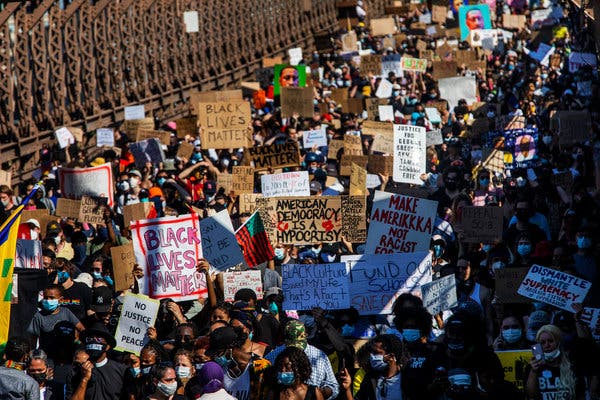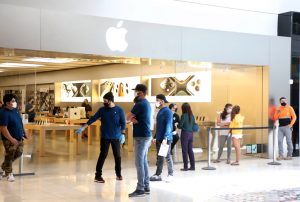A few hours after the Manhattan district attorney announced he would not prosecute some of the protesters who had been arrested during demonstrations against police brutality, the Police Department sent him a message: All the officers assigned to his office would be pulled off the job to help with crowd control.
The district attorneys in the Bronx, Brooklyn and Queens made similar decisions and received the same news.
Police Commissioner Dermot F. Shea said on Friday that the timing was unrelated to the prosecutors’ decisions. Resources were pulled from the entire department to cover the protests, he said.
But to some in the prosecutors’ offices, the episode was emblematic of a growing divide between the police and most of the city’s district attorneys over how to address public outrage about racial disparities that pervade the criminal justice system.
As thousands have taken to the streets in New York City to protest the police killing of George Floyd in Minneapolis, and more broadly, systemic racism in America, the city’s prosecutors have taken an increasingly liberal stance on issues of policing.
The prosecutors went so far last week as to support the Legislature’s decision to make chokeholds a crime and to repeal a law that kept police misconduct records secret — a forceful disavowal of the status quo, which largely protected abusive officers.
“We must take action against the use of excessive force by the police,” said a statement signed by four of five of the city’s district attorneys. In a separate letter, the Staten Island district attorney expressed his support for the Legislature’s actions.
In a sense, the growing distance between the two pillars of local law enforcement reflects a political reality. Unlike police commanders and police union leaders, the prosecutors must stand for re-election in a city where public opinion has swung hard over the last month in the direction of reining in the police department and cutting its budget. But the decision to drop charges against some of the protesters is also part of a longer-running trend.
In recent years, the district attorneys in Brooklyn, Manhattan and the Bronx — now joined by Queens — have scaled back prosecutions for minor crimes like marijuana possession and turnstile jumping, because disproportionate numbers of black and Hispanic residents were arrested for these offenses, and prosecutors did not believe they were serious enough to justify a criminal record. More recently the prosecutors have declined to seek convictions for many social-distancing violations for the same reason.
On Friday, Mr. Shea denied that the police leadership and the district attorneys were at odds. For the last six years, he said the Police Department also has been steadily shifting its strategies, though, he added, “maybe not as fast as some people like.”
“Are we always in lock step? No,” he said. “We’re human beings and from different agencies.” Still, he noted arrests and summonses have been cut dramatically over the years, and officers have been focused on violent crimes rather than minor offenses.
But some senior police commanders were furious about some district attorneys’ decisions not to prosecute, people familiar with the matter said, speaking on the condition of anonymity to discuss internal meetings. Police union leaders said some of the prosecutors were caving in to public pressure and picking which laws they wanted to enforce.
“It is a dereliction of duty to their oath of office,” said Edward D. Mullins, the president of the Sergeants Benevolent Association. “More important than undercutting the work of the N.Y.P.D., it is undercutting public safety.”
Police personnel were also pulled from the district attorney’s office in Staten Island, which tends to take a more conservative approach to law enforcement than the prosecutors in the other four boroughs. Ryan Lavis, a spokesman for the office, did not respond to several requests for information on how the office was handling protesters accused of minor offenses.
Two weeks ago, a few days into the protests, demonstrations turned violent as police officers and protesters clashed in the streets. Images of burning police vehicles and looting led the mayor to impose a curfew.
But videos of officers using excessive force on demonstrators also appeared on social media and on the evening news, and after the curfew was imposed, officers were filmed using batons on peaceful demonstrators who appeared to have done little more than march past the deadline. The mayor and the police drew fire from many elected officials.
On June 6, four of the city’s five district attorneys said that they would not pursue convictions against people arrested on minor charges at protests, though they all said they would prosecute people accused of violence against officers and looting. District attorneys in other major cities like Los Angeles and Miami had made similar announcements.
“The protests are important, powerful and are very positive,” the Manhattan district attorney, Cyrus R. Vance Jr., said in a recent interview. “We need to make sure we protect that activity.”
The Brooklyn district attorney, Eric Gonzalez, took a similar position, saying, “We stand for the right of people to protest.” In Queens, District Attorney Melinda Katz said her office would not prosecute anyone who had merely protested, “which is a First Amendment right.”
Beyond immediate political considerations, the prosecutors’ decisions reflected differing philosophies on law enforcement in the city. The district attorneys have moved away from their traditional role as law-and-order enforcers and have embraced efforts to put fewer offenders in jail.
Mr. Gonzalez has been at the forefront of the move to reduce the jail population and has clashed with the police over gun arrests. He has tossed many cases in which searches were possibly unconstitutional and has diverted young gun offenders into community programs instead of jail.
Mr. Vance also has said that he is committed to minimizing unnecessary interactions with the criminal court system and reducing racial disparities and the impact on people’s lives that low-level prosecutions have.
“The justice system shouldn’t be the first resort,” Mr. Vance said in an interview. “It should be used only when necessary, especially for low-level offenses, which tend to fall on men and women of color and those economically less resourced.”
Ms. Katz, who is in her first year as the Queens district attorney, has taken a similar stance, saying that it makes more sense, for instance, to divert low-level drug offenders to social service programs. “You shouldn’t have a record for that following you for the rest of your life,” she said.
Chuck Wexler, executive director of the Police Executive Research Forum, a law enforcement policy nonprofit, said the police still feel a responsibility to respond to “quality of life issues,” like people who congregate on a street corner where marijuana is being sold. But he said that prosecutors “feel like it’s low-level crime and nothing really happens, so why spend the resources?”
“There’s two competing perspectives here,” he said.
The scaling back of the types of crimes district attorneys are willing to prosecute has widened the rift between the police and prosecutors, some policing experts said.
“There are no more law-and-order district attorneys,” said Joseph L. Giacalone, a retired N.Y.P.D. sergeant and professor at John Jay College of Criminal Justice. “The pendulum has swung so far left.”
Not only have the district attorneys declined to prosecute protesters charged with unlawful assembly, disorderly conduct and curfew violations, but they have been aggressively going after police accused of assaulting protesters. About 40 officers are under investigation, officials have said.
In Manhattan, employees in Mr. Vance’s office have been scouring social media for videos of police abuse. The office is investigating allegations that officers assaulted the Wall Street Journal reporter Tyler Blint-Welsh, who is black and was covering the protests and had his press badge displayed.
The office is also reviewing the conduct of officers from a violent social-distancing arrest on May 2 in the East Village in which one of the officers sat and knelt on the neck and upper torso of a man he was arresting.
In that case, Mr. Vance declined to prosecute the men accused of violating social-distancing rules. Enforcement of these rules has targeted black and Hispanic men, The Times has reported.
In Brooklyn, Mr. Gonzalez charged police officer Vincent D’Andraia with misdemeanor assault after video showed that he violently pushed a woman during a protest. The woman was hospitalized with a concussion as a result of the encounter.
“Individual cases are one thing that we can do as district attorney,” Mr. Gonzalez said. “But we have to make structural and systemic changes to prevent these acts from happening again.”
Ali Watkins contributed to this report.



















